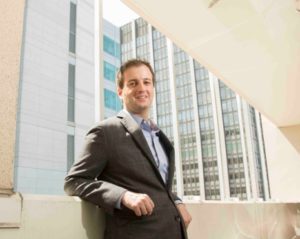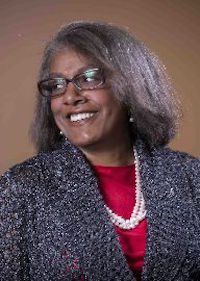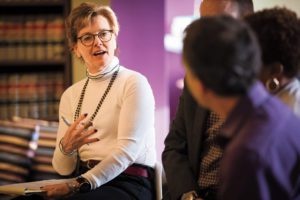UC Law SF Fuels Academic Innovation with Five New Centers
UC Law SF College of the Law inaugurated a handful of new programmatic centers this fall, each designed to provide innovative educational opportunities as well as promote the school’s thought leadership across a vast legal academic landscape.
The new centers—the Center on Business Law, the Center on Tax Law, the Racial Justice Center, the Government Law Center— plus LexLab, which opened its doors in 2017, bring together top industry leaders, alums and partners to tackle critical legal topics.
“Our new centers create hubs of scholarship and activity connecting students, faculty, alumni, and the wider community. They tie together our curriculum, our scholarship, our commitment to teaching and learning, and the wider practice community,” said Academic Dean and Professor of Law Morris Ratner.
These centers are part of a broader academic push that will allow the College’s lattice of academic, cultural and professional communities to come together to forge exciting, profound and impactful work. To do so, top faculty were pegged to helm the initiatives.
“Intellectual leadership and innovation are the common threads across these subject centers,” Ratner said.
Learn more about each center below:
Center on Business Law
The Center on Business Law aims to advance the College’s legacy as an innovator in the study and practice of business law. Still in its nascency, the center is already well on its way toward reaching its goals.

Professor Jared Ellias
“The goal is to create a community of students, alumni and friends who are interested in studying, teaching and practicing business law,” said Professor Jared Ellias, who serves as the center’s director.
In June, the center brought in leading bankruptcy scholars from Stanford, University of Pennsylvania, Georgetown and Virginia law schools to discuss current research in bankruptcy law. It’s already offered summer fellowships. And, it established a business law concentration at the College.
The center has already connected with more than 100 alumni dating back to the 1920s, and there are plans to host multidisciplinary workshops, bringing in top law scholars to present fresh research on topics on business law.
“We’re meeting unmet student demand for programming in the area of business law,” Ellias said. “In the future we hope to roll out special programming for first-generation professionals and women who are interested in business law.”
Center on Tax Law
Hastings has a rich legacy in tax law. The College’s tax law program has stood as a model for the study and practice of tax law for decades. Some of the state’s top tax lawyers, including Mark Vorsatz, managing director and CEO of Andersen Tax, Tom Hutchinson, vice president of finance at Google, Jeffrey Angeja, administrative law judge with the California Office of Tax Appeals, and Vivian Tsoi, international tax director at Facebook, graced the halls of Hastings. Advancing that legacy and supporting the college’s Taxation Law concentration meant launching a center.
“We’re building off a historic and distinctive strength in this area,” said Professor Heather Field, Eucalyptus Foundation Chair and senior co-director of the center.
Field, along with co-director Professor Manoj Viswanathan, are aiming to connect alums, faculty and students, while also creating a center that means as much to current students as the historic tax program meant to alums. In just a short period of time, the center has brought in alums to speak on in-house tax careers and speakers to present on current issues in tax law and policy.
Racial Justice Center
How can race be contextualized in discussions of American law? That’s the central theme former Academic Dean and Professor Shauna Marshall plans to explore with the Racial Justice Center.

Shauna Marshall
“I think our students have been yearning for a more honest portrayal of how race factors in the development of American jurisprudence,” said Marshall, an expert in civil rights law.
Marshall, who teaches a course called Race, Racism and American Law, is hoping to offer key insights for students interested in race and law, as well as engaging faculty who want to learn how to better incorporate diversity in their curriculum. The hope is the center will also play a role in advancing Hastings’ diverse campus community.
In addition to finding ways to integrate race into core law school classes, Marshall plans to launch a series of podcasts in the spring based on her lectures on the topic of race and American law.
Government Law Center
In the mid-1970’s, Hastings embarked on a groundbreaking program that allowed students to tackle critical problems identified by California Legislature. For more than two decades, students worked directly with the state and county governments to solve some of the most pressing legal issues. That program laid the foundation for the Government Law Center.
Professor Emeritus David Jung, a tort law expert whose work with the Public Law Research Institute led to the creation of a comprehensive database of health privacy laws, serves as interim faculty director of the new center. Students across all disciplines come together to learn about the government through seminars, symposia and even through experiential learning opportunities, like legal clinics.
A partnership between the clinic and the College’s Career Development Office will alert students of the types of employment opportunities that exist, Jung says.
LexLab
The legal industry is on the precipice of change thanks in large part to technology. And Hastings, positioned in the epicenter of technological innovation, is equipping law students with the skills to help lead the change. That’s where LexLab comes in.

Professor Alice Armitage moderates the Salesforce Experience Panel
Led by Hastings Director of Law and Technology Alice Armitage, LexLab stands at the nexus of legal technology. The center—an innovation hub bringing on its first cohort of legal tech companies— is finding ways to leverage big data, artificial intelligence, and tools capable of reviewing thousands of cases far faster than any human.
Armitage and Chancellor and Dean David Faigman envision big changes ahead for the industry, specifically to the field of legal education.
“It would almost be irresponsible of us, as a law school in San Francisco, not to build on the benefit of our location and engage with the tech space. This area is leading a revolution in tech and innovation, an intellectual revolution, and we have an intention to be a contributor,” Faigman said earlier this year.
Not only is LexLab reshaping the way students learn about law, the center is becoming a go-to resource for people and organizations who want to learn more about the legal tech field.